Suivi et évaluation
La plupart des défis liés au suivi et à l’évaluation, comme la quantité insuffisante d’investissements et le manque de capacités, ne sont pas spécifiques à l’assistance monétaire, mais ceux qui le sont concernent principalement le suivi des résultats des transferts non affectés. La flexibilité des transferts monétaires peut compliquer la définition d’indicateurs de résultats appropriés, qui pourraient impliquer un mélange d’indicateurs spécifiques au secteur et transversaux. En parallèle, il existe des limitations au moment de collecter des données précises sur la manière dont les transferts monétaires sont dépensés.
Les signataires du Grand Bargain se sont engagés à garantir que des mécanismes de suivi et d’évaluation pertinents des transferts monétaires soient en place, et à assurer une meilleure compréhension des coûts, avantages, impacts et risques de cette modalité par rapport à d’autres. En partant de cet engagement, le chantier du Grand Bargain sur les transferts monétaires a établi plusieurs points d’action, dont le développement d’indicateurs de résultats communs pour les transferts monétaires à usages multiples, et des indicateurs pour l’analyse de l’optimisation des ressources. L’analyse systématique de l’optimisation des ressources a été rendue difficile par plusieurs facteurs, dont un manque d’approches approuvées, le besoin en données sur les résultats en termes de qualité et le caractère intensif de l’analyse.
Priorités actuelles
Dans le cadre des engagements du chantier du Grand Bargain sur les transferts monétaires, le CALP Network a co-dirigé (avec l’USAID et CRS) la mise au point d’indicateurs de résultats des transferts monétaires à usages multiples. Le projet à tester est actuellement disponible en anglais, espagnol et français, via la bibliothèque.
Initiatives associées
Contenu présenté

Indicateurs de résultats des transferts monétaires à usages multiples : Projet final à tester
Guides et outils
Les indicateurs présentés dans ce document se concentrent sur les principaux objectifs des TMUM humanitaires et sur les résultats auxquels les transferts monétaires à usages multiples peuvent le plus fortement contribuer. (Par exemple, certaines interventions en TMUM visent à relier les personnes aux systèmes de protection sociale après la fin du TMUM; mais nous n’avons pas inclus...

Monitoring 4 CTP: Monitoring Guidance for CTP in Emergencies
Guidelines and Tools
This guidance provides a central resource to promote a common understanding of the most important monitoring considerations for humanitarian projects using cash transfer programming (CTP). The primary audience for this guidance is field-level practitioners, from organisations directly involved in the design, implementation, monitoring, and accountability of projects using cash and vouchers...

Cost-Efficiency Analysis of Basic Needs Programs: Best Practice Guidance for Humanitarian Agencies
Guidelines and Tools
The Efficiency, Effectiveness and Value for Money Sub-Workstream is pleased to share the final output on Cost-Efficiency Analysis of Basic Needs Programs: Best Practice Guidance for Humanitarian Agencies (attached).
Cost-efficiency analysis estimates the ratio of program costs to outputs created, allowing you to compare cost-per-output for programs which all produced the same output. Such...
Thematic lead
Contenu récent
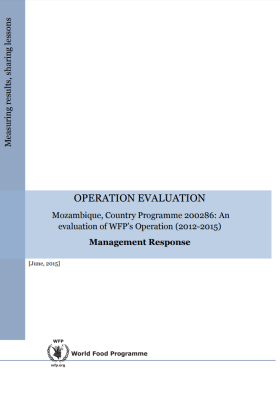
Mozambique, Country Programme 200286: An evaluation of WFP’s operation (2012-2015) – Management Response
Report
The final evaluation covers WFP’s country programme (CP) 200286 (2012-2015). It was intended for both accountability and learning purposes and focuses on assessing: the appropriateness and coherence of the operation its results the factors explaining the results. The evaluation assessed the...
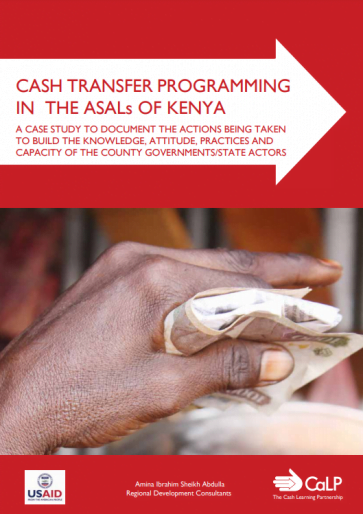
Cash Transfer Programming in the ASALs of Kenya
Case Study
The CALP Network commissioned a study to document the impact and lessons learned from its engagement with state actors in the ASAL counties. The study involved collection of data through secondary and primary sources. Given the focus of the project, a qualitative approach was deemed as most...

Documentation and Learning: Rapid emergency assistance to Typhoon Ruby (Hagupit) affected communities in the province of Samar, Philippines April 2015
Report
The documentation and learning study identifies good practices and lessons from the implementation of the Rapid Emergency Assistance to Typhoon Ruby (Hagupit) Affected Communities in the Province of Samar by Christian Aid (CA) and its local NGO partners – Coastal Core Incorporated (CCI), Center for...

Impact of Multipurpose Cash Assistance on Outcomes for Children in Lebanon
Report
This report examines the impact of multipurpose cash assistance (MCA) on children, specifically looking at child outcomes and child protection outcomes, in Lebanon. The impact of the Lebanon Cash Consortium MCA program was measured using a variety of indicators for shelter quality and consistency, child...
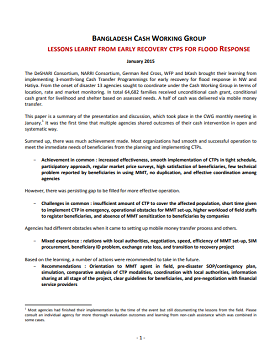
Bangladesh Cash Working Group: Lessons Learnt From Early Recovery CTPS For Flood Response
Report
The DeSHARI Consortium, NARRI Consortium, German Red Cross, WFP and bKash brought their learning from implementing 3-month-long Cash Transfer Programmings for early recovery for flood response in NW and
Hatiya. From the onset of disaster 13 agencies sought to coordinate under the Cash Working Group in...

Orientations opérationnelles et boîte à outils pour les transferts monétaires à usages multiples
Guides et outils
Les présentes orientations opérationnelles et la boîte à outils qui l’accompagne réunissent une expertise mondiale sur les interventions monétaires. Elles apportent aux acteurs humanitaires des orientations complètes et pratiques afin d’évaluer la faisabilité des transferts monétaires,...

Value for Money of Cash Transfers in Emergencies
Report
The objective of this study is to analyse evidence on the Value for Money (VfM) of cash transfers. The study reviews evidence on the economy, efficiency and effectiveness of cash, vouchers and in-kind transfers, in order to support a more structured analysis of the VfM of different transfers. It is based...

Integrating Cash Transfers into Gender-Based Violence Programs in Jordan: Benefits, risks and challenges
Report
With limited global practice and guidance on programming cash transfers to enhance protection in an emergency context, in 2013, the International Rescue Committee’s (IRC) started cash transfer programming (CTP) as part of the urban Women’s Protection and Empowerment (WPE) program in Jordan. Three...

Transferts monétaires sans condition: perspectives et points de vue des bénéficiaires en RDC, au Népal et aux Philippines
Rapport
La distribution d’aide monétaire dans des situations d’urgence humanitaire se généralise et fait l’objet d’amples débats au sein du secteur humanitaire en abordant des sujets variés, qu’il s’agisse de la reconnaissance à un haut niveau de l’assistance monétaire comme outil capable...
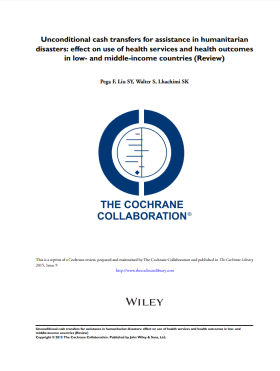
Unconditional Cash Transfers for Assistance in Humanitarian Disasters: Effect on use of health services and health outcomes in low- and middle-income countries
Report
Unconditional cash transfers (UCTs) for humanitarian assistance during disasters may improve health in low- and middle-income countries (LMICs) by giving recipients additional income. This study sought to assess the effect of UCTs on health services use, health outcomes, social determinants of health,...

Cash Transfer Programming for Syrian Refugees: Lessons Learned on Vulnerability, Targeting, and Protection from the Danish Refugee Council’s E-Voucher Intervention in Southern Turkey
Report
DRC Turkey is currently implementing a two-year, DFID-funded project that aims to provide immediate support to and strengthen the coping mechanisms of vulnerable non-camp Syrian refugees in southern Turkey. The first phase of the project focused on identifying and providing monthly cash transfers (in the...

Workshop Report – Cash Transfer Programming (CTP) in Northern Syria: Where are we now and where do we want to be?
Report
This report summarizes the outcomes of a one day workshop on Cash Transfer Programming (CTP) that was organized by the Cash-Based Responses Technical Working Group (CBR-TWG) for Northern Syria on April 28th 2015 in Gaziantep, Turkey. The workshop was attended by a wide group of stakeholders from the...

The Impact of Cash Transfer Programmes on Protection Outcomes in Afghanistan
Report
Although cash-based interventions (CBIs) are increasingly used to deliver humanitarian assistance in support of more traditional in-kind emergency distributions, there is now a growing, global acceptance among stakeholders of the need to pay closer attention to the positive and negative impact of CBIs on...

Rapport de l’atelier d’apprentissage " Être prêt pour les transferts monétaires"
Guides et outils
Malgré une évolution rapide et dynamique de la mise en oeuvre des transferts monétaires en Afrique de l’Ouest, le manque de préparation des acteurs ne permet pas l’optimisation du potentiel de la modalité. Ainsi, l’échelle des interventions demeure limitée, la combinaison de modalités...

Electronic Cash Grants in Emergencies: Approaches and lessons learned
Report
Cash distributions in an emergency: A concept that seems so obvious today yet has only recently gained recognition within humanitarian response programming for its speed, efficiency and—above all—effectiveness.
This document provides a snapshot for humanitarian response peers on best practices,...

Kit for Autonomous Cash transfer in Humanitarian Emergencies (KACHE)
Guidelines and Tools
The present document reports the development of the Kit for Autonomous Cash transfer in Humanitarian Emergencies (KACHE), built upon Red Rose ONE system© supported by the WFP’s Cooperating Partners’ Innovation Fund (CPIF). Firstly, it gives a brief description of the main features of the kit....
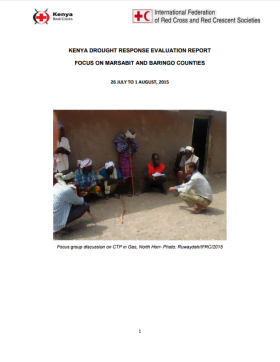
Kenya Drought Response Evaluation Report – Focus on Marsabit and Baringo Counties
Case Study
An evaluation of a drought response which involved school feeding, cash transfers and nutrition outreach activities.

Guidance Notes: Cash Transfers in Livelihoods Programming- West Africa
Guidelines and Tools
A growing acceptance of cash transfers as an inter-sectorial tool is accompanied by a better understanding of this approach and its potential to break the cycle of poverty, after much discussion on the role cash transfers have to play in building resilience. In the Sahel, food security experts have...
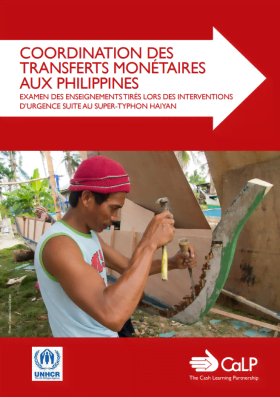
Coordination des Transferts Monétaires aux Philippines: Examen des enseignements tirés lors des interventions d’urgence suite au Super Typhon Haiyan
Rapport
Les cinq dernières années ont été marquées par la tendance au recours accru aux transferts monétaires comme modalité d’interventions en situations d’urgence dans l’ensemble du secteur humanitaire. La fongibilité des transferts monétaires, dès lors qu’ils sont effectués sans restriction,...
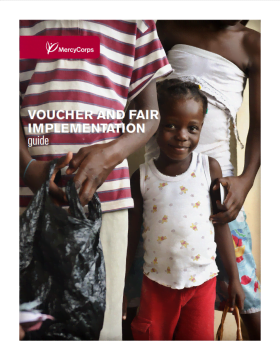
Voucher and Fair Implementation Guide
Guidelines and Tools
Mercy Corps’ Voucher and Fair implementation Guide provides clear, step-by-step guidelines for teams implementing cash, restricted cash, or commodity voucher programmes. Written for an internal audience, the Guide may also be useful for peer agencies.
